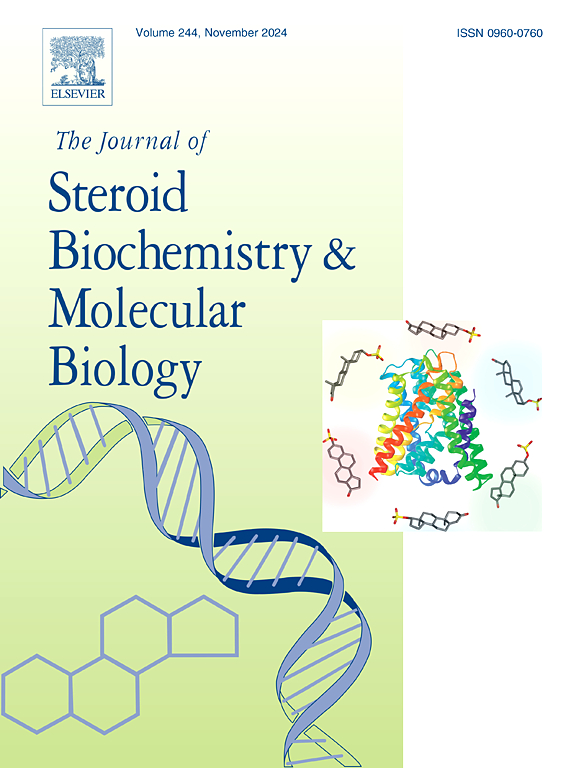维生素D受体多态性及其在浸润性乳腺癌进展中的作用
IF 2.5
2区 生物学
Q3 BIOCHEMISTRY & MOLECULAR BIOLOGY
Journal of Steroid Biochemistry and Molecular Biology
Pub Date : 2025-06-18
DOI:10.1016/j.jsbmb.2025.106819
引用次数: 0
摘要
维生素D不仅在维持骨骼健康和调节钙水平方面起着至关重要的作用,而且还涉及一些骨骼外的功能,包括细胞生理、增殖、分化、抗癌作用、免疫反应调节和炎症控制。其生物学效应是由核维生素D受体(VDR)介导的,它是类固醇激素受体家族的一员。该VDR基因的遗传变异,如FokI (rs2228570)和TaqI (rs731236)单核苷酸多态性(SNPs),可能改变VDR表达水平,损害蛋白质功能,并可能增加乳腺癌的风险。然而,这些多态性与乳腺癌之间的关系仍然存在争议。本研究旨在评估摩洛哥妇女VDR基因的FokI和TaqI多态性与乳腺癌易感性之间的关系。在这项研究中,我们收集了乳腺癌组织和对照样本,并提取了基因组DNA。采用TaqMan实时聚合酶链式反应(RT-PCR)对FokI和TaqI snp进行基因分型。我们的研究结果显示,乳腺癌患者和对照组之间的FokI基因型分布有显著差异(p = 0.031)。FokI多态性与组织预后分级(p <; 0.001)、肿瘤分期(p = 0.011)、孕激素受体(PR)状态(p = 0.004)显著相关,TaqI多态性与雌激素受体(ER)状态显著相关(p = 0.016)。这些结果提示VDR基因的FokI多态性可能影响乳腺癌的易感性。确定这些遗传变异可以为乳腺癌的发病机制提供有价值的见解,并为个性化治疗策略开辟道路,包括使用VDR激动剂作为针对乳腺癌的靶向治疗。本文章由计算机程序翻译,如有差异,请以英文原文为准。
Vitamin D receptor polymorphisms and their role in invasive breast cancer progression
Vitamin D plays a critical role not only in maintaining bone health and regulating calcium levels, but is also involved in several extra-skeletal functions, including cell physiology, proliferation, differentiation, anti-cancer effects, modulation of immune responses, and inflammation control. Its biological effects are mediated by the nuclear vitamin D receptor (VDR), a member of the steroid hormone receptor family. Genetic variations in this VDR gene, such as the FokI (rs2228570) and TaqI (rs731236) single nucleotide polymorphisms (SNPs), may alter VDR expression levels, impair protein function, and potentially increase the risk of breast cancer. However, the relationship between these polymorphisms and breast cancer remains controversial. This study aims to assess the association between the FokI and TaqI polymorphisms of the VDR gene and breast cancer susceptibility in Moroccan women. For this study, breast cancer tissues and control samples were collected, and genomic DNA was extracted. Genotyping of FokI and TaqI SNPs was performed using TaqMan Real-Time Polymerase Chain Reaction (RT-PCR). Our findings revealed a significant difference in the distribution of FokI genotypes between breast cancer patients and controls (p = 0.031). The FokI polymorphism was significantly associated with histoprognostic grade (p < 0.001), tumor stage (p = 0.011), and progesterone receptor (PR) status (p = 0.004), while the TaqI polymorphism showed a significant association with estrogen receptor (ER) status (p = 0.016). These results suggest that the FokI polymorphism of the VDR gene may influence breast cancer susceptibility. Identifying these genetic variations could provide valuable insights into breast cancer pathogenesis and open avenues for personalized treatment strategies, including the use of VDR agonists as targeted therapies against breast cancer.
求助全文
通过发布文献求助,成功后即可免费获取论文全文。
去求助
来源期刊
CiteScore
8.60
自引率
2.40%
发文量
113
审稿时长
46 days
期刊介绍:
The Journal of Steroid Biochemistry and Molecular Biology is devoted to new experimental and theoretical developments in areas related to steroids including vitamin D, lipids and their metabolomics. The Journal publishes a variety of contributions, including original articles, general and focused reviews, and rapid communications (brief articles of particular interest and clear novelty). Selected cutting-edge topics will be addressed in Special Issues managed by Guest Editors. Special Issues will contain both commissioned reviews and original research papers to provide comprehensive coverage of specific topics, and all submissions will undergo rigorous peer-review prior to publication.

 求助内容:
求助内容: 应助结果提醒方式:
应助结果提醒方式:


